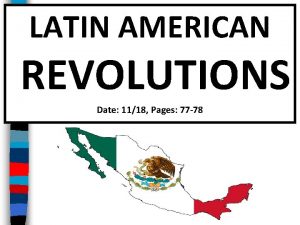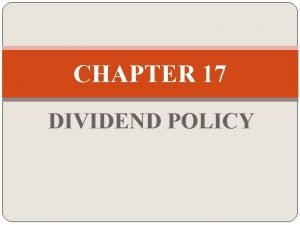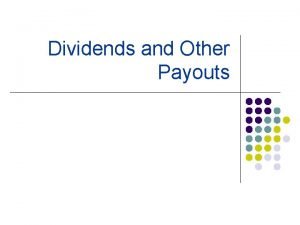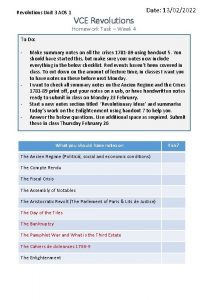Revolutions Unit 3 AOS 1 Date 30012022 VCE


- Slides: 2

Revolutions Unit 3 AOS 1 Date: 30/01/2022 VCE Revolutions Homework Task 2 What the Examiners said about these questions: • Signposting: Some students skilfully signposted their response by using ‘firstly’, ‘secondly’, ‘thirdly’, etc. to note their points, or language such as ‘furthermore’ to link points. • Make an argument and make judgements – don’t just explain: The best students developed an argument, which was required by the wording of the question, and delivered their points chronologically. Teachers should explain to students that ‘Explain the importance’ and ‘How did…contribute to’ mean that judgements are required, and the question will not be successfully addressed by simply listing events and describing them. • Don’t waste time: Less successful students often gave only one or two points and expanded on these. They also wasted time ‘introducing’ their answer through needless repetition of the question and adopted a narrative style of writing. Weaker still were answers which gave a description of the event. Questions: 1) Using 3 -4 points, explain how Necker’s Compte rendu in 1781 contributed to a revolutionary situation by May 1789 provide evidence to support your answer Necker’s Compte Rendu of 1781 painted the state of France’s economy in an extremely optimistic light. The nation was not, as the report suggested in possession of a 50 million livre surplus, rather, it was millions of livres in debt and would be bankrupt by 1786. The Compte Rendu highlighted the willingness of the king’s ministers to tell him what he wanted to hear, and thus the inefficiency of absolutism. When, in 1789, the dire state France’s finance was in began to be revealed, it seemed sudden and made the king appear ‘out of touch’ with the reality the people of his country faced, thus increasing resentment towards him as a ruler. The workers and peasants who were faced with great economic problems after the disastrous harvest of 1788, and the resentment they felt was exacerbated by the financial crisis and the king’s inability to handle it by imposing reforms on the Notables and parlement. With the need for reform evident to the rising bourgeoisie, coupled with the economic crisis, Necker’s Compte Rendu contributed to the politicisation of the Third Estate, and the evolution of economic problems into political discontent.

Revolutions Unit 3 AOS 1 Date: 30/01/2022 VCE Revolutions Homework Task 2 What the Examiners said about these questions: 2) • Don’t just list events: Many responses did not show connections well and often listed information without explaining the contribution to the revolution or revolutionary situation. Excellent responses used correct and specific historical terms and included dates, places and names. However, many students simply supplied a list of events or a narrative without making the connection to the role these events played in bringing on the revolution • Many things cause a revolution: The best answers showed an excellent range of knowledge and responded well to the cue ‘how did’. They showed a clear understanding of the contribution of events to the revolutionary situation and explained the steps in a logical sequence. Using 3 -4 points, explain how the consequences of France’s involvement in the American War of Independence contributed to the development of the revolution from 1783 -1789. Provide evidence to support your answer The most imminent consequence of the War of Independence, where France had allied with America against Great Britain, was the dire situation that it had left the French economy in. Over 1 million livres had been spent on the war effort, financed mainly on loans and by 1786 France was facing bankruptcy. This was the catalyst for the 1786 Assembly of Notables and the 1787– 1788 ‘Aristocratic Revolt’ with the Parlement of Paris that precipitated the rising and unmet class expectations throughout France. The crisis was heightened by the extreme food shortage that had arisen in Paris due to the little money in the economy. By 1789 an average urban worker in Paris was spending around 75% of his wage merely on bread. This only created a further revolutionary situation as grocery riots erupted alongside the poor harvest of 1788– 89. Ideologically, the American War of Independence brought back news of a revolution against the monarchy and ultimately it made the philosophes previous ideas real and achievable. Thus ‘American Spirit’ is considered by Simon Schama as one of the more prominent ideological influences. Leader La Fayette was one of the main advocates of the American Revolution as he had returned from there as a general, and his influential status certainly provoked further ideas of revolution by 1789.



